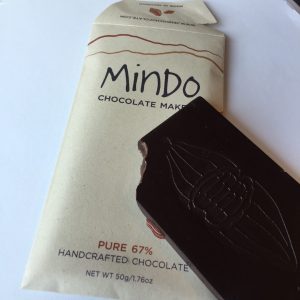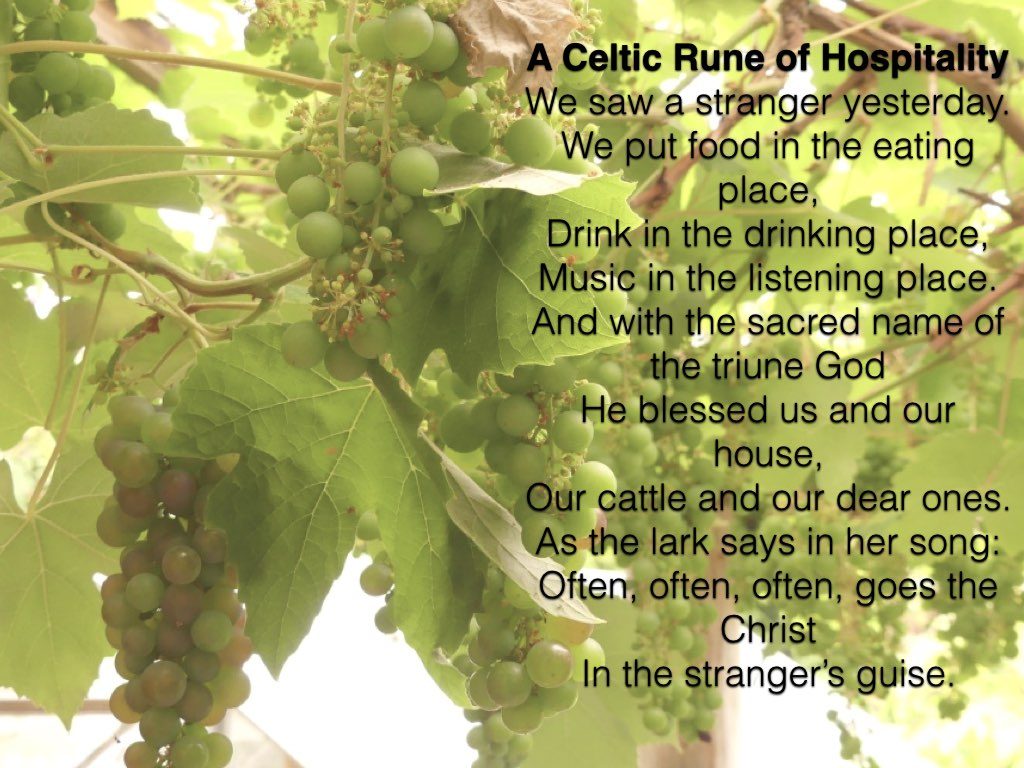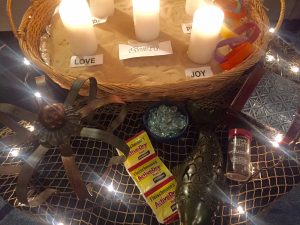
As I was thinking about Shalom and Wholeness this week I was reminded about my need to take time to Savor the gifts and goodness of God.
To savor is to enjoy something completely!
Do I enjoy God’s goodness?
Am I paying attention to the gifts God is giving me each day?
Am I savoring the moments and the gifts along the way?
Sometimes the calendar gets so filled up with activities and responsibilities that I miss the sweetness of God’s love for me.
Sometimes I’m so distracted by the news, or my fear,
that I lose even the desire to taste and see.
I too often forget my need to savor.
In my heart I do know that God is love
And God is good
And God provides gifts for me!
If I’d only open my eyes and take time to see them!
I want to savor the colors I see and really see them!
The greens of the lettuce and the blue of blueberries and the dark purple of good wine.
I want to savor that hug from a friend and the kiss from my spouse.
I want to watch for dragons in the clouds and take the time to smile.
I want to learn how to savor God’s goodness in the glimpse of a deer in the woods
And a good cup of coffee or a fresh cup of tea.
To savor a sunset, a rainbow, a field filled with sunflowers
Or a good piece of chocolate.
Take a chance and savor the goodness of God around you today.
Drop the old packages you are carrying so you can receive and savor the new gifts Jesus has for you!
Buy a piece of good chocolate and taste and see that the Lord is good and has good stuff in store for you and me today, this hour, this moment.
It’s the only day we have to enjoy and savor.
By Hilary Horn —
Peace = shä·lōm’, שָׁלוֹם – completeness, soundness, welfare, peace
Peace isn’t just a fluffy feeling, or something iconic from the 60s. Peace or shalom, is much more than that.

Photo taken by Hilary Horn in South Africa
Often when I get asked to speak about “social justice” people expect me to speak about my work with various injustices throughout the world like sex trafficking, child-led homes, or something that sounds really fancy and dangerous. These are all great, and part of “justice” when we walk it out, but I often think we get a perspective that is often too highly uplifted. We rather focus on things that sound more thrilling than working on our own hearts. We forget about the other aspects that encompass justice – one of those being transformed as a person of peace or shalom.
What I have found is that many do not realize that Righteousness/Justice/Peace are virtual synonyms as nouns in the bible. They mean life with all relationships, with God, others, self, and the rest of creation. Life is well ordered, so that life is full of shalom or well being, all things flourishing as God designed them to be. Justice is the pursuit of shalom that God intended for the world and humanity and the righteous person is one who contributes to such life. A righteous person is someone that brings justice and peace. It’s naturally part of their character.

Photo taken by Hilary Horn in Haiti
So when we are walking in righteousness, peace fills the earth; justice is shown. You cannot separate them from each other. The kingdom of heaven comes down in dark places. We are walking in what Jesus has for us and bringing the kingdom to earth – true peace.
When we walk in these truths, justice comes. When we walk in the sacrifice and obedience to what Christ calls us – that is when we see justice and change in our world. That is where we see peace in our communities.

Photo taken by Hilary Horn in the Philippines
What I have learned through walking in what Jesus has called us into is God is always in control and his love never wavers. No matter if our best planned out intentions don’t always work out the way we expected. Justice isn’t just about saving lives or whatever romantic view we have of changing the world. Justice and peace starts with the very core of our hearts. His love for us does not waver on our journey to be a righteous person. He is willing to journey with us through the deserts and valleys so that we become more defined and refined in His purposes and character.
Walking out justice, is truly a process. Being a person of peace is a journey. If you truly believe in the gospel, then you have to believe that it matters not just for your personal salvation and blessings, but also for God’s pursuit of restoration, redemption and reconciliation for the entire world.

Photo taken by Hilary Horn in Dominican Republic
The “now, and not yet” Kingdom. It’s bringing restoration and redemption to earth of how God intended it.
The gospel isn’t just a ticket to heaven or a fluffy nice feeling of peace. As Christians, we should be about the full work of God: yes evangelism, but also the work of shalom, restoration and redemption.
People don’t want to hear that because changing our hearts is much more difficult than doing a one time mission trip or social awareness event. Most of us have this deep desire to change the world. But what we lack is a posture of humility that we need to become more aware of. We have to start realizing that “I too, must change.” I too must first learn to listen and learn. I too, must become a person of peace.
This month our themes will be on health, wholeness and shalom. Thank you, Britni D’Eliso, for kicking us off on health and wholeness! —
My daily mantra as a mental health therapist is “self-care, self-care, self-care.”
I spend the majority of my therapy sessions encouraging my clients to consider how creative they can get in developing a list of ways to care for their body, mind and spirit; whether it’s going on a walk, taking a bath, or simply remembering to take a breath. This is a priority as a therapeutic intervention, as a well cared-for self is better prepared to handle unforeseen stressors that pop up throughout the day and can better maneuver the intricacies of relating with others, despite their current state of health and well-being.
But of course, irony rears it’s often ugly head in the reality that I rarely heed my own advice.
As a mother of two littles who works a full-time job outside of the home, it can feel hopelessly impossible to create space for prioritizing myself and my health. I find myself often taking solace in consuming the blog and vlog vent-sessions of fellow working moms who provide and endless slough of the almost humorous misperceptions of “what moms do all day” and the copious amounts of unrealistic advice out there regarding how to incorporate a 30 minute exercise routine and scheduled list of chores into your daily agenda (ha!).
My go-to response is cynicism and sarcasm. But, surprise surprise, that doesn’t lend to a healthy pattern of self-care either!
My biggest obstacle is my tendency to thrive on to-do lists. For any personality-assessment nerds out there like myself, I am an INFJ on the Myers-Briggs and a “1” on the Enneagram. In other words, I like lists, and I’m very task-oriented. Although this can be very helpful in completing projects and maintaining a weekly meal plan, it can backfire a bit when I am needing to simply be at rest.
So for those of you in my camp of the personality spectrum, OR for those who are simply not satisfied with the status-quo of advice available these days… I have some advice for you. 🙂 But before you check out, roll your eyes, or build your argument of defense, hear me out.
This recommendation doesn’t come from my lived experience (in fact, I’m really just now starting to try it out myself). It comes from the One who created you and me. The One who understands how our minds and hearts are wired, what our body needs, and the way that rest and deep connection with self and others keeps us ticking.
 It turns out that His Holy Scriptures not only consist of a beautiful story of humanity and His redemption, but they were delivered through the lens of human beings. And though those humans lived millennia ago, they likely still shared in the same emotions and off-balance priorities that we know all too well. However, their connection to the Divine allowed them to be privy to significant truths that still prove relevant today:
It turns out that His Holy Scriptures not only consist of a beautiful story of humanity and His redemption, but they were delivered through the lens of human beings. And though those humans lived millennia ago, they likely still shared in the same emotions and off-balance priorities that we know all too well. However, their connection to the Divine allowed them to be privy to significant truths that still prove relevant today:
Moses relays God’s instruction in Exodus 20:8-10 — “Remember the Sabbath day by keeping it holy. Six days you shall labor and do all your work, but the seventh day is a sabbath to the LORD your God. On it you shall not do any work, neither you, nor your son or daughter, nor your male or female servant, nor your animals, nor any foreigner residing in your towns. For in six days the LORD made the heavens an. d the earth, the sea, and all that is in them, but he rested on the seventh day. Therefore the LORD blessed the Sabbath day and made it holy.
In other words, we are to do our work and do it well. AND THEN we are to set aside time, intentionally and proactively, to rest. This may requires upping your spontaneity, or if you’re like me, scheduling in a window of rest. This strategy is the very thing that allows me to write this blog: I take two-ish hours every Thursday morning (my day off) to escape to a coffee shop (my sanctuary) for some rest and time to write. This happens because my husband is a rockstar and because it’s in the calendar, so we know to work around it.
David identifies that rest is found in the presence of the Lord in Psalm 23 (and this message is reiterated throughout all of Psalms) — The LORD is my shepherd, I lack nothing. He makes me lie down in green pastures, he leads me beside quiet waters, he refreshes my soul. He guides me along the right paths for his name’s sake. Even though I walk through the darkest valley, I will fear no evil, for you are with me; your rod and your staff, they comfort me. You prepare a table before me in the presence of my enemies. You anoint my head with oil; my cup overflows. Surely your goodness and love will follow me all the days of my life, and I will dwell in the house of the LORD forever.
We can garner inspiration even from the metaphors David uses, of a shepherd, green pastures, quiet waters, etc. David speaks to the rest found in companionship with our relational God, and hints at how that connection can be found in nature. Nature may have been a bit more accessible to David, while he was living in the wilderness, however we can get creative in 2017 too. Whether it’s taking the kids on a walk around the nearest park, going on a hike (I’ll admit I’m spoiled with hiking opportunities here in the Pacific NW), or sitting in the grass in your backyard. I’m not talking about a Robinson Crusoe adventure here, just creating opportunity to experience a tangible and meditative connection with this earth that God hand-crafted.
At this risk of getting preachy or of wagging my finger, I’m going to stop here and let you dig in to the relevant wisdom found in His Scriptures. Be pleasantly surprised at how God’s words are sensitive to our very human needs and how His personal and intimate nature is revealed in His devotion to our well-being, as His precious children.
See references below for your own study:
 Britni D’Eliso is a quiet but fearless spirit who is earnestly seeking the beauty of the redemption that Jesus has personally determined for her life. Committed to the truth that listening breeds understanding and understanding results in compassion, she clings to the power of life’s stories. She has embarked on the venture of discovering her own story and lending an ear to the stories lived out in others and savors the trace of Jesus that is woven throughout them all. Currently, that journey has landed her in a balancing act between the role of wife, momma (to Shiloh & Eden), and a mental health therapist in Eugene, Oregon.
Britni D’Eliso is a quiet but fearless spirit who is earnestly seeking the beauty of the redemption that Jesus has personally determined for her life. Committed to the truth that listening breeds understanding and understanding results in compassion, she clings to the power of life’s stories. She has embarked on the venture of discovering her own story and lending an ear to the stories lived out in others and savors the trace of Jesus that is woven throughout them all. Currently, that journey has landed her in a balancing act between the role of wife, momma (to Shiloh & Eden), and a mental health therapist in Eugene, Oregon.
This month our themes will be on health, wholeness and shalom. Thank you Lynne Baab for kicking us off! —
My husband and I, along two friends, were eating dinner together, and I wanted to take the conversation deeper. So I said, “Sometimes I find it useful to pray for one thing for people I care about. I ask myself, ‘If I could pray for just one thing for this person, what would it be?’ I’ve got a couple of people for whom I pray for joy. So I wonder, if I wanted to pray for one thing for each of you, what would it be?”
We tossed around a few words, and someone suggested “peace” as the one thing to pray for someone we know. Later in the discussion, I suggested “shalom” as the one thing to pray for someone else. One of our friends turned to me and said, “We’ve already discussed peace. Isn’t ‘shalom’ just the Hebrew word for peace?”
Peace and shalom are somewhat different, and I want to write about the significance of that difference.

Illustration by Lynne’s Husband.
Peace is generally viewed as the absence of war or conflict, which includes both inner and outer strife. The concept of peace includes tranquility and relational harmony. Jesus promised to give us peace, and anyone who has struggled in relationships or with anxiety or depression knows that God’s peace is an enormous gift.
The Hebrew concept of shalom includes what we consider to be peace, but also much more. To experience God’s shalom is to experience wholeness and well-being in all aspects of life. Wholeness and well-being obviously involve the absence of destructive conflict in all areas of life and the presence of some degree of tranquility. However, wholeness and well-being also include physical health, financial stability, a sense of purpose in life and meaningful work. You may be able to think of more components.
The Hebrew word “shalom” occurs 237 times in the Old Testament and is usually translated “peace,” “safety” or “welfare.” This word occurs in the very oldest fragment of the Old Testament that archaeologists have discovered, Numbers 6:24-26, often called the Aaronic blessing. In this chapter of Numbers, God tells Moses to instruct Aaron and his sons to bless the people with these words. In English we usually use “peace” in the last line, but I’ve changed the last line to reflect the meaning of the original Hebrew word, “shalom.” See what different meaning is conveyed to you by this version:
The Lord bless you and keep you;
The Lord make his face to shine upon you, and be gracious to you;
The Lord lift up his countenance upon you, and give you wholeness and well-being in every area of your life.
You may enjoy experimenting with different words for that last line to capture what you consider to be the best way of describing the kinds of well being you long for. Then say the blessing over yourself and those you love.
Experiencing shalom doesn’t make a person selfish. Instead, experiencing shalom enables a person to love and serve. After all, wholeness and well-being include healthy, loving relationships, and for a Christian, being whole includes obeying God, serving in the world after the model of Jesus, guided by the Holy Spirit.
I like to pray for shalom for family members and friends, and as I pray that word, I think about the forms of well-being I long for in their lives. And I like to pray for shalom in my own life, too.

by Christine Sine
As you read today’s post, Tom and I are probably winging our way across the Atlantic towards home. We are at the end of one of the most remarkable journeys of our lives. Part celebration, part pilgrimage, it has reconnected us to friends and revitalized our faith, enriching our lives with new perspectives and understandings in so many ways.
Hospitality as the Godspace theme for July may have been chosen by accident to coincide with this trip, I realize but it has been a very intentional theme for me throughout the entire journey. Now as we head into August with a new theme – shalom, wholeness and the kingdom of God – the significance seems to grow.
Celtic Christians believed hospitality was a doorway into the kingdom of God and as I reflect back on my own experiences in this last month I feel I understand more clearly what they meant. The forming of friendships through hospitality, the breaking down of barriers between strangers, the overcoming of fear of the other who is different are all glimpses of the kingdom of God brought into being through hospitality.
The kingdom of God is the ultimate place of hospitality. It is the place where friend and stranger from different cultures, ages and social strata all sit together at a great banquet feast, just as we have done with so many over the last month. It is a place where there is much fun and laughter and celebration, where barriers of class, culture and misunderstanding are broken down. Where fear becomes love, indifference becomes caring and enemies become friends. It is a place where hospitality and welcome beckon all of us towards healing and wholeness.
It is this kind of feast that I think is previewed in Isaiah 25:6
In Jerusalem, the Lord of Heaven’s Armies
will spread a wonderful feast
for all the people of the world.
It will be a delicious banquet
with clear, well-aged wine and choice meat.
Years ago, I remember seeing a painting that supposedly depicted this banquet feast of God. I say supposedly because it was a very formal dinner table set with beautiful plates and lots of silverware. But there were no people at the table and, to be honest, I cannot imagine most of my friends and acquaintances feeling comfortable with such formality anyway.
The kingdom banquet feast will be a place where not only do all feel welcomed but all feel honored and respected. None of us will feel out of place because we don’t know which utensils to use for which course. None of us will feel conspicuous because we don’t eat meat or dairy or gluten. There will be something for all of us to enjoy. And who will be serving the meal at that feast? Jesus our great and glorious servant king will.
Some of the last and most enduring images we have of Jesus combine hospitality and service – washing feet at the last supper, cooking breakfast on the beach for his disciples after his resurrection – hospitality and servanthood, the culture of the kingdom, the rich and enduring signs of welcome that we have experienced time and again over this last month.
These are the images that come to my mind as I think of Lilly Lewin’s question When you think of the kingdom of God what comes to mind? For me the kingdom of God is like the banquet feasts we have experienced in so many places on our travels. But it is not just a feast for us and a few friends, it is a feast for everyone.
What is Your Response?
When you think of the kingdom of God what comes to mind?
This is probably one of the most important questions for us to grapple with. Listen to the recording of The Irish Rune of Hospitality below and sit quietly in the presence of God. Think about the eternal world of God and especially that great banquet feast to which we will all be welcomed at the end of time.
What images come to mind for you? What actions could you take to make this place of welcome a reality, at least in some small way, today?
As we end this month’s theme on hospitality we will enter into our August theme of health, wholeness and shalom. Thank you Steve Wickham for this great post to close and enter a new chapter —
“Hospitality means primarily the creation of free space where the stranger can enter and become a friend instead of an enemy. Hospitality is not to change people, but to offer them space where change can take place. It is not to bring men and women over to our side, but to offer freedom not disturbed by dividing lines.”
― Henri J.M. Nouwen (1932 – 1996)
Reaching Out: The Three Movements of the Spiritual Life
Reading Nouwen’s thought brought me to reflect on how rare this is — the freedom to let others be, in community. Of course, it’s an ideal, one worth working for. It is aspirational, yes, but worth the work to bring it into being. And this work is truly the antithesis of work, other than the setting up of an environment in faith it will work.
It talks about inclusive space. Where there are no outliers whatsoever. Where all-comers are accepted and embraced. Where place is not just environment but home. Where a complete stranger may feel coherence between the environment’s structure (its rules) and their own values. Where comfort comes from within, and the person can be as they actually are.
Can we see how this allows the person to exist in health, wholeness and shalom? That health, wholeness and shalom are no unattainable destination, but the very way we go about getting there. Where health, wholeness and shalom are not simply an end in themselves but also a cogent, vibrant and productive means; because of the input, hospitality.
The central tenet of Nouwen’s ethos, then, is that hospitality is what it is without challenging people’s mindsets to change. It isn’t transactional, like the exchange of environment on condition that the person accommodated do this or that to ‘pay for’ what has been given — presumably freely — for hospitality cannot cost if it is what it is.

Photo by Steve Wickham
But hospitality can be the source of change, and therein lies the action of trust (and inaction of attitudes of suspicion, etc) by the mysterious and wondrous work of the Holy Spirit. If change is to occur, change that God’s Spirit initiates, the manifestation of that change will be a mystery, for all things of the Spirit cannot be rationally explained, such is the power of God.
What is most inspiring and encouraging for a community is to see God at work in their midst through a sign; that there is absolutely no coercion — no imprint of cajoling humanity on it at all. There is freedom to love and be loved, and there’s no second guessing for motives. And the fruit of the Spirit is enjoyed and experienced in such cherished places.
Hospitality is synonymous for health, wholeness and healing.
One equals the other, and vice versa.
These are no utopian dreams to those who have experienced the possibilities of such powers of grace in community. For a community of persons to attain to the heights of trust, and to experience true freedom, however, some innate taking of responsibility is a must. There must be some commitment of spiritual quest; some reason or desire for sowing into community in the first place. But otherwise, all there ought to be is space.

By Lilly Lewin—
This week, the Gospel passage in the lectionary for July 30th, is from Matthew’s gospel where Jesus talks about all the different things the Kingdom is like…all the various comparisons and contrasts. We used Matthew 13:31-33 and 44-52 this past week at thinplaceNASHVILLE ( our “house church” community ) At thinplace, we open by praying the psalm aloud together and then listening to gospel passage with three voices from two versions of the Bible. Then everyone is given 30 minutes to be with the passages and I give several questions to consider while journaling (see these below) and there are art supplies to use if you like praying in art.
After the 30 minutes of reflection, we come back together and those who want to, share what God spoke to them about. Sometimes God brings up questions, sometimes, people write poems during the journaling time. Sometimes people (like me) draw in response to what the Holy Spirit is teaching. After the sharing time, we close with an element that ties the story together and helps us remember what we talked and learned about. For this passage, this week, I had symbols of the various Kingdom is like elements on the coffee table…a fish net, packages of yeast, a jar of mustard seeds and small bowl of treasure rocks. As we closed our time together, I passed around the treasure rocks and reminded us that Jesus came to earth to find us as his treasure! We are valued greatly by Jesus! We are the pearls and the treasures that he seeks and loves. We each took a treasure rock to carry with us this week to remind us to live out the Kingdom and our belovedness.
Your turn! You can pray this on your own in your own devotion time this weekend or use it with your small group or with your family or friends. You might even try this ectio divina process with your entire community group and have them listen and allow the Holy Spirit to teach them what God’s word is for them today!
Use the psalm and/ or the Gospel passage as your inspiration.
Write, Journal or create art. Allow the Holy Spirit to inspire you!
What is God’s word for you today? What is God speaking to you about today?
Welcome to thinplaceNASHVILLE
Let’s Pray the Psalm out loud together:
Psalm 105:1-11 (NLT)
1 Give thanks to the Lord and proclaim his greatness.
Let the whole world know what he has done.
2 Sing to him; yes, sing his praises.
Tell everyone about his wonderful deeds.
3 Exult in his holy name;
rejoice, you who worship the Lord.
4 Search for the Lord and for his strength;
continually seek him.
5 Remember the wonders he has performed,
his miracles, and the rulings he has given,
6 you children of his servant Abraham,
you descendants of Jacob, his chosen ones.
7 He is the Lord our God.
His justice is seen throughout the land.
8 He always stands by his covenant—
the commitment he made to a thousand generations.
9 This is the covenant he made with Abraham
and the oath he swore to Isaac.
10 He confirmed it to Jacob as a decree,
and to the people of Israel as a never-ending covenant:
11 “I will give you the land of Canaan
as your special possession.” AMEN
Matthew 13:31-33, 44-52 (NIV)
31 He told them another parable: “The kingdom of heaven is like a mustard seed, which a man took and planted in his field. 32 Though it is the smallest of all seeds, yet when it grows, it is the largest of garden plants and becomes a tree, so that the birds come and perch in its branches.”
33 He told them still another parable: “The kingdom of heaven is like yeast that a woman took and mixed into about sixty pounds of flour until it worked all through the dough.”
44 “The kingdom of heaven is like treasure hidden in a field. When a man found it, he hid it again, and then in his joy went and sold all he had and bought that field.
45 “Again, the kingdom of heaven is like a merchant looking for fine pearls. 46 When he found one of great value, he went away and sold everything he had and bought it.
47 “Once again, the kingdom of heaven is like a net that was let down into the lake and caught all kinds of fish. 48 When it was full, the fishermen pulled it up on the shore. Then they sat down and collected the good fish in baskets, but threw the bad away. 49 This is how it will be at the end of the age. The angels will come and separate the wicked from the righteous 50 and throw them into the blazing furnace, where there will be weeping and gnashing of teeth.
51 “Have you understood all these things?” Jesus asked. “Yes,” they replied..
52 He said to them, “Therefore every teacher of the law who has become a disciple in the kingdom of heaven is like the owner of a house who brings out of his storeroom new treasures as well as old.”
Matthew 13:31-33, (THE MESSAGE)
31-32 Another story. “God’s kingdom is like a pine nut that a farmer plants. It is quite small as seeds go, but in the course of years it grows into a huge pine tree, and eagles build nests in it.”
33 Another story. “God’s kingdom is like yeast that a woman works into the dough for dozens of loaves of barley bread—and waits while the dough rises.”
34-35 All Jesus did that day was tell stories—a long storytelling afternoon. His storytelling fulfilled the prophecy:
I will open my mouth and tell stories;
I will bring out into the open
things hidden since the world’s first day
“God’s kingdom is like a treasure hidden in a field for years and then accidentally found by a trespasser. The finder is ecstatic—what a find!—and proceeds to sell everything he owns to raise money and buy that field.
45-46 “Or, God’s kingdom is like a jewel merchant on the hunt for excellent pearls. Finding one that is flawless, he immediately sells everything and buys it.
47-50 “Or, God’s kingdom is like a fishnet cast into the sea, catching all kinds of fish. When it is full, it is hauled onto the beach. The good fish are picked out and put in a tub; those unfit to eat are thrown away. That’s how it will be when the curtain comes down on history. The angels will come and cull the bad fish and throw them in the garbage. There will be a lot of desperate complaining, but it won’t do any good.”
51 Jesus asked, “Are you starting to get a handle on all this?”
They answered, “Yes.”
52 He said, “Then you see how every student well-trained in God’s kingdom is like the owner of a general store who can put his hands on anything you need, old or new, exactly when you need it.”
Use the psalm and/ or the Gospel passage as your inspiration. Write, Journal or create art. Allow the Holy Spirit to inspire you!
What is God’s word for you today? What is God speaking to you about today?
Things to consider while Journaling….
- When you think about the kingdom of God what comes to mind? What do you think or feel about the Kingdom of God?
- Some people don’t like the word Kingdom because of the power struggle or the violence that it might bring to mind. What about you? What if you put in “the REIGN of God” instead of the word Kingdom? How does that change things?
- We pray in the Lord’s Prayer, your kingdom come, your will be done on earth as it is in heaven….how would you like to see or help bring the kingdom or reign of God to earth in and through your lfie?
- Which of the symbols/metaphors for the Kingdom of God makes the most sense to you and your life? Why?
- How would you change your life in order to live more in the Kingdom or Reign of God?
- God’s kingdom is like the owner of a general store who can put his hands on anything you need, old or new, exactly when you need it…. What do you think of this?
- What are the new treasures God has for you?
Closing Prayer prayed together:
LORD ! Give us grace today to love as you love. Help us to love with extravagance..
Give us hope today for ourselves and others.
Heal our hurts and our hearts today
So we can serve and help those around us.
Help us to know that you are enough.
And help us live today and everyday in thankfulness
For all you’ve done and for all you bless us with. In the Name of the Father, Son & Holy Spirit !
AMEN

***The word thinplace is a celtic term for a place where the veil between heaven and earth is thin,
a place where heaven and earth seem to touch. A place where you experience God and can feel his presence most easily. Everyone has experienced thinplace. It might be the beach, or in the mountains, or watching the sunset. It might be when you practice yoga or run or cycle. The Celtic Christians believed there were specific physical places that were thinplaces and these became places of prayer and often a monastery was built near by.
After visiting some of these thinplaces, in the UK and Ireland, Rob and I wondered how we might experience thinplace in everyday life? So we began hosting thinplace gatherings in Cincinnati, then in Napa Valley, and now in Nashville.
As an Amazon Associate, I receive a small amount for purchases made through appropriate links.
Thank you for supporting Godspace in this way.
When referencing or quoting Godspace Light, please be sure to include the Author (Christine Sine unless otherwise noted), the Title of the article or resource, the Source link where appropriate, and ©Godspacelight.com. Thank you!
